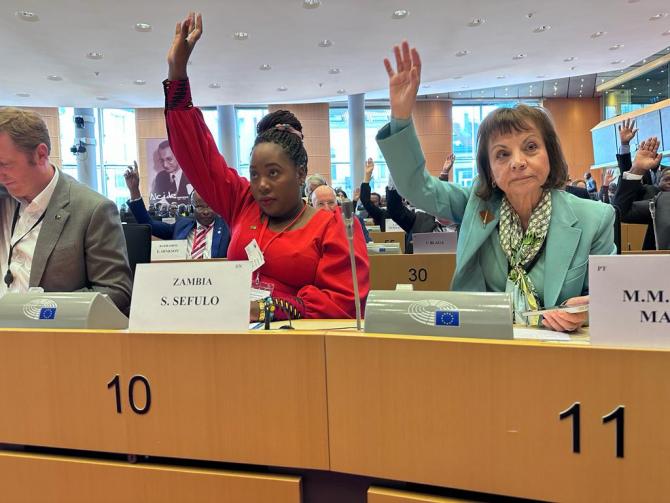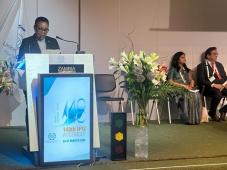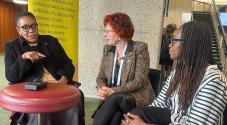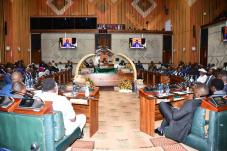The Chairperson of the Committee on Economic Development, Finance and Trade of the Organisation of African, Caribbean and Pacific States (OACPS), Hon Sibeso Kakoma Sefulo, who is also Mwandi Member of Parliament, has expressed concern at the delay in the signing of the New Partnership Agreement (NPA) between the OACPS and the European Union (EU).
Speaking during the 62nd OACPS Parliamentary Assembly and the OACPS–EU intersessional meetings in Brussels, Belgium, Hon Sefulo said the delay in signing the Post-Cotonou Agreement is especially disadvantaging OACPS countries in terms of trade and development. In this regard, she observed that unilateral decisions made by the EU, pertaining to sustainable trade regulations, vis-à-vis the Carbon Adjustment Border Mechanism (CBAM), the Corporate Sustainability Due Diligence Directive and the Deforestation Regulation, would negatively affect OACPS countries’ capacity to attain sustainable development.
The regulations are within the Green Deal Framework to make climate, energy, transport and taxation policies fit for reducing net greenhouse gas emissions by at least 55% by 2030, compared to 1990 levels. With this, the EU seeks, among others, to reduce deforestation caused by the EU’s imports and consumption of certain agricultural goods, such as cocoa, coffee, palm oil, soy, beef and wood, by promoting sustainable production methods in line with SDG 12. The EU also seeks to adjust the price of certain imported products by the amount of CO2 emissions embedded in them, so as to equalise the cost of carbon between EU produced goods and comparable imports. Another regulation requires EU companies to ensure that their own operations and those of their supply chains are fully compliant with national and international laws protecting human rights and the environment. This dictates that companies must integrate a ‘duty of care’ in their behavior and address any adverse impacts of their actions on human rights and the environment. The directive targets a broad range of ‘high-risk’ sectors, including agriculture and agro-processing, fisheries, and manufacturing such as textiles, clothing and various mining products.
It is envisaged that if exporters from OACPS countries do not invest in systems needed to measure, monitor, report and verify carbon emissions, they may be subjected to punitive measures, resulting in higher carbon taxes. OACPS exporters also risk losing market competitiveness, making it difficult for them to trade favourably on the EU markets.
In view of the foregoing, Hon Sefulo said it was important for the OACPS and the EU countries to quickly sign the Agreement, as a guiding framework for the Partnership, as well as re-negotiate with the EU on the new sustainable trade regulations because of their serious negative effects on OACPS countries. She also called on the EU to find ways of helping affected countries to gradually adapt to the new regulations by offering technical and other relevant support in areas such as Research and Development (R&D).
Hon Sefulo also challenged the EU to relax their immigration laws, which posed challenges when accessing EU Visas, even for diplomatic travellers invited to attend important meetings such as ACP-EU JPA.
Meanwhile in a joint Statement by the ACP and EU Co-Presidents, Hon. Ana Rita Sithole and Hon. Carlos Zorrinho, respectively, affirmed that signing of the Post-Cotonou agreement was an urgent priority. The Co-Presidents stated that the New Agreement would act as a multilateral platform for political dialogue, economic and social cooperation. They also underscored the need to ensure that the new Agreement was adapted to current and future common challenges linked to the 2030 Agenda for sustainable development, from climate change to promoting human rights, peace and stability, governance and growth.
The statement was released following the ACP-EU Joint Parliamentary Bureau meeting, in which delegates were informed that the delay in signing the NPA was as a result of one EU member country (Hungary) refusing to sign the Agreement. It was, however, hoped that by June, 2023, the NPA would be signed in order to avoid a legal gap in the existence of the OACPS-EU partnership.
The OACPS and EU JPA intersessional meetings took place from 25th February to 2nd March, 2023, in Brussels, Belgium.




